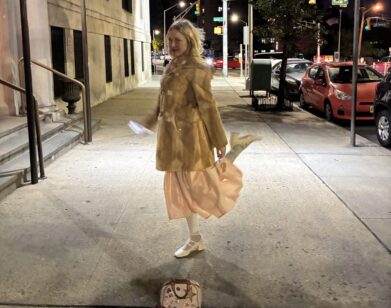IN CONVERSATION
Lauren Oyler Wishes You’d Fact-Check Your Reviews
I first discovered Lauren Oyler, as many did, when I read her scathing review of Jia Tolentino’s essay collection Trick Mirror in LRB. Tolentino was a writer I felt got too much credit for making facile observations, and I whispered as much to other writers I knew. That Oyler had the temerity to slaughter a sacred cow was a sign she was in the trenches with the rest of us. The people’s critic now has her own essay collection, No Judgment, a flirtatious meditation on criticism itself. Covering material relevant to tri-coastal freelancers (Gawker, autofiction, speaking English in Berlin), it reads like a vape-smoke filled teacher’s lounge for writers, with its meta-references to being a book (the final chapter is titled “TK KICKER”—editor parlance for “poignant little ending pending.”) If you, as I do, endeavor for others to read your occasional essays and come away thinking “wow, what a hilarious genius!” then you will appreciate the intimacy on hand. To mark the occasion, Oyler spoke with me from her parents’ home in West Virginia, where we discussed forbidden words, bad reviews, and trolling your audience.
———
LAUREN OYLER: Hi, nice to meet you.
STEVEN PHILLIPS-HORST: Very nice to meet you.
OYLER: I’m in West Virginia, so this is the trash room. That’s why there’s trash behind me.
PHILLIPS-HORST: I was imagining something really authentically West Virginia, with squirrels running in the background and dad on the porch with the shotgun.
OYLER: No. I find people ask me about West Virginia very rarely, and when they do I’m like, “Oh, it sucks and it’s been ruined by corporate greed and politicians.” It’s not particularly beautiful where I live. You say that and people from West Virginia and rural America get mad at you because they’re like, “You don’t know what it’s like.” And I’m like, “I do know what it’s like, and that’s why I don’t live there.” They’ll never vote for better healthcare because they don’t want to admit that the healthcare they have is destroying their lives and terrible or anything like that.
PHILLIPS-HORST: They don’t see the exurban, sad, dissociative wasteland around them, the 12-lane highway they have to cross to get to the Starbucks.
OYLER: Yeah. And I mean, they haven’t been anywhere else, and that’s also the failure of the American government.
PHILLIPS-HORST: Well, now that we’ve been sufficiently coastal elitist and established our point of view, we can get into discussing this book. First of all, congratulations on your book.
OYLER: Thank you.
PHILLIPS-HORST: It’s really impressive. As Heidi Montag once said, “Congratulations to anyone who has ever written a book.” Now, you’ve written two.
OYLER: If I can do it, anybody can do it. I’m from West Virginia.
PHILLIPS-HORST: When you first announced it, I remember you were like, “All the essays haven’t been published anywhere else first.” Often, when you come out with a book of essays, some of these works have previously been published in The New Yorker, et cetera.
OYLER: That was always my intention. Basically, I had three or four essays that I wanted to do for magazines, but then I got tired of writing for magazines. I especially didn’t want to write these essays for magazines because of those constraints that magazines often put on you.
PHILLIPS-HORST: They’re like, “It’s not newsy enough.”
OYLER: Or they cut all the jokes, first things first.
PHILLIPS-HORST: Editors love to make a piece worse. No offense.
OYLER: I wanted to write these long, digressive pieces, and some of them are quite theoretical. With the anxiety essay, I was like, “No magazine is going to let me do a 4,000-word list of symptoms before I get to the point.” Right? I didn’t want my second book to be mostly pieces about other people’s writing, particularly because I am, for better or worse, so well-known for those negative book reviews. And personally, I sympathize with the consumer, and I am not going to buy a book that contains mostly material that I can read online for free. So that’s the rationale.
PHILLIPS-HORST: So, this is a book of criticism but it’s also about criticism. I assume that you’re reading the reviews.
OYLER: Mm-hmm.
PHILLIPS-HORST: There’s been some raves, there’s been some not raves. You’re sparking conversation. This is an aggressive question…
OYLER: I’m an aggressive person.
PHILLIPS-HORST: Do the not-raves make you question your entire previous career of writing not-raves?
OYLER: No.
PHILLIPS-HORST: You didn’t have a Seth Rogen moment like, “Wait a minute, I am vulnerable, I’m just a human. Maybe I shouldn’t have taken this person down”?
OYLER: No. When I write book reviews, I try to read the book as generously as I can and really engage with it. I also have a background in journalism, so I’m somewhat neurotic about getting things right. Some critics do not care so much about that, and that’s perfectly fine. But I fact-check my book reviews.
PHILLIPS-HORST: I do think criticism can be right or wrong.
OYLER: Yeah, of course.
PHILLIPS-HORST: I mean, most elements of it can be. You can say, “This point they made feels wrong because they didn’t marshal sufficient evidence to support it” or “This particular turn of phrase is cliche.” Those can be true things that are somewhat unassailable.
OYLER: Also, if you cannot engage with my book in the actual arguments and substance of it in order to say something bad about it, why would I question what I’ve done? I think in general, I want to anticipate the flaws in my writing, and that’s what any serious writer should do if you want to try and get better.
PHILLIPS-HORST: I have a dream of writing a book of essays where one of the essays is a review of the book and one of the essays is a pan of the book and really emulate the style of a bitchy critic and a fawning critic. You have to own the story, you know?
OYLER: Yeah, you’ve got to own it. There’s so much in the book that’s about what we expect of public figures, what is a public figure, what are the ethics of gossip, what are the ethics of criticism, and in the context of social media? And I do try to walk the walk, which is to say, “If I want people to pay attention to me, then I have to accept the unfortunate drawbacks of that situation.”
PHILLIPS-HORST: You have to put on your gloves and get in the ring.
OYLER: There’s one paragraph in the book, it’s the only intentionally provocative paragraph I’ve ever written.
PHILLIPS-HORST: I think I know what paragraph you’re talking about.
OYLER: Literally the headline is “Elitism.” And that’s why I’m going like, “Listen to all this elitist stuff that I do.” And it’s really interesting to see who falls for that, because I thought we knew what trolling was and had sort of moved past this irony vs. sincerity conversation.
PHILLIPS-HORST: I’m so into that, because I actually wrote, “I thought the Goodreads chapter felt like bait.” You basically paint this picture of a community of plebe reviewers drunk with power, ready to cancel anything that has a whiff of politics they disagree with. And then after you’ve set up this horde of unwashed masses, these keyboard warriors who are complete idiots, you have a whole section where you’re like, “Oh, and I’m a total elitist.” It’s so funny to see the real pans of your book all glob onto that paragraph. “She admitted it! She said it!”
OYLER: It’s also just funny to trick people into embarrassing themselves. Maybe some of them watch more TV than others, but we all more or less went to Ivy League schools, so it’s not exactly a scandal. But I do think it has something to do with my tone, which I have thought a lot about and will not be changing. There’s this ironic voice that I use sometimes that allows me to say, “Isn’t it funny I went to an Ivy League school?” And I think that’s disarming, because you’re not actually supposed to say that, right?
PHILLIPS-HORST: You’re supposed to be ashamed or embarrassed.
OYLER: Yeah, you’re supposed to be ashamed. In general, writers are supposed to be ashamed of themselves. I can’t think of another medium or art form where the practitioner is supposed to pretend like they didn’t mean it. Like, “Oh, I just accidentally wrote this book. I had to write it, it was in my soul. It just poured out of me.” Can you imagine a director or a painter being like, “Oh, I hate painting actually, I’m so sorry. I pale in comparison to Helen Frankenthaler.”
PHILLIPS-HORST: Maybe athletes do that sometimes. Female athletes will be like, “Oh, I don’t know… I just do this really well because that’s how I learned it.”
OYLER: Not to bang on about David Foster Wallace over and over, but his great essay on Tracy Austin, the tennis player, and the Dumb Athlete Memoir is pretty useful here.
PHILLIPS-HORST: Okay, wait, I need to read that.
OYLER: It’s good. It’s really short too.
PHILLIPS-HORST: I’ve read all the Dumb Athlete Memoirs. The postgame interview is one of the most inane humiliations in American life.
OYLER: You should definitely read it. It’s called “How Tracy Austin Broke My Heart.”
PHILLIPS-HORST: I remember getting so much pushback from this piece I wrote about all these dumb self-help books. And one of them was Brené Brown, so I loved your essay that includes her, because she’s so fucking annoying, and she’s such a scam artist and an idiot, and her books are insufferable.
OYLER: What’s amazing to me about that is the trickle-down effect. I kept noticing people talk about vulnerability all the time. And then you go to the source and you’re like, “Oh, all of these New Yorker writers are basically citing this self-help scammer.” They’re writing these book reviews about Magic Mike’s like, “vulnerable working-class body.” You know what I mean?
PHILLIPS-HORST: The insistence on collapsing language at every turn. I love the line when you were like, “As the queer spaces like to say, radical softness is a boundless form in the distance.” I saw a sign at a coffee shop recently that was, “Tattoos as communal care.”
OYLER: Or it’s like, “Going to the rave and doing a bunch of drugs is actually a radical political act.” I think that’s just residue from our previous political era where everything had to be political or you had to do it in secret. It just seemed like we’re getting out of that.
PHILLIPS-HORST: I don’t know. I think the 2008 election was permanent.
OYLER: It’s a good argument. I think you should write that.
PHILLIPS-HORST: I just think that Hillary versus Obama calcified everyone into these camps where everything could be either new or old or right or wrong. It was also the beginning of obsessively turning politics into Marvel lore. There basically hasn’t been a week off since the Hillary-Obama fight.
OYLER: Yeah, but I do feel like the rapidly changing and deteriorating digital media ecosystem is producing something like a local media culture, which is not to say there are local papers, because there aren’t. I only noticed this because I’m doing publicity, and now so much of it, as opposed to when I published my novel three years ago, is newsletters. And there are lots of problems with that, but I certainly am less concerned with someone trying to ruin my life on Twitter if there’s a bunch of anonymous Reddit guys trying to attack me. Actually, a lot of anonymous guys from Reddit read that Washington Post review, based on the people who wrote about me on Twitter afterwards. It doesn’t really matter, but it doesn’t feel like your life is ruined anymore, which is nice.
PHILLIPS-HORST: I no longer have the fear. When I wrote this column regularly for Interview and The New Yorker, I was always brushing up against the radically online queer community and sometimes was on the verge of cancellation. It really did stress me out to just suddenly be getting a million quote tweets from people. But that era does seem to be over, and Twitter is basically dead.
OYLER: I always liked your writing, because you are unrepentant about making the kind of jokes that you’re going to make and you’re quite confident that it’s not harming anybody.
PHILLIPS-HORST: Thank you.
OYLER: In dark times, I was like, “At least they’re still doing Talk Hole.”
PHILLIPS-HORST: Hopefully we’re no longer the salve that society needs.
OYLER: No, I hope not.
PHILLIPS-HORST: This brings me to the question of plausible deniability. Is that a theme in your book at all? I certainly feel like it’s a theme in my writing, where I’m often carefully trying to make a joke that could appeal to a broader audience and could potentially be read by someone over here, but also by someone over there, as funny. It’s often on a woke-versus-anti-woke spectrum of someone being like, “Oh, you could be making fun of progressive politics, or you could be making fun of the limitations of language and how it prevents politics from being progressive.”
OYLER: Yeah, of course. That’s why the idea that we shouldn’t be using irony is ridiculous, because it allows you to express this ambiguity. Everyone wants there to be a judgment, everyone wants you to be like, “Is it bad or good? Are you pro or against?” And it’s very limiting if you’re any kind of writer, but particularly if you are a funny writer.
PHILLIPS-HORST: This came up when I was thinking about you in Berlin. When people ask you what you do, what do you say?
OYLER: I flip my hair and I say, “I’m the preeminent and most widely read critic of my generation.” And they’re like, “Really?” And I’m like, “Yeah, according to The Sunday Times UK.”
PHILLIPS-HORST: Would you say that to an Uber driver?
OYLER: No, I say I’m a writer. I mean, I can read the room. It depends on the context. If an Uber driver’s like, “What do you do?” I say, “Oh, I’m a writer.”
PHILLIPS-HORST: Then they say, “Oh, what do you write?” And you say?
OYLER: It depends. I say, “I wrote a novel,” and people know what that is. It’s just so much easier to say than, “I write cultural criticism.” What do you say?
PHILLIPS-HORST: Well, I really switch it up. I often will just say “copywriter” because I feel like that’s the most noble and normal job. And then they might be impressed if I’m like, “Oh, I do advertising for brands, I don’t know, Botox, Hilton.” They’re like, “Oh my goodness.” But it’s humiliating to say, “I’m a writer-comedian and I have a podcast.”
OYLER: They don’t care. But that’s why I have my little bit, you know what I mean? Also, I can do it because I’m a woman.
PHILLIPS-HORST: Well, I’m a gay guy, which is the same thing.
OYLER: You can also do it.
PHILLIPS-HORST: Do you use a thesaurus regularly?
OYLER: Regularly, when I’m writing, I’ll star a word when I want to use a different word and I’ll go back to it. And then sometimes I’m like, “I actually don’t need to find another word.” The best thesaurus is Roget’s International Thesaurus. And the concept of this thesaurus is wonderful. They have an online version that sucks, so you have to have the actual thesaurus. And it’s humongous. Basically, you look up a word, and it has a number, and then you go to the number and the words are grouped. The system is that the words are grouped by senses and meanings. So if you’re looking up a synonym for “windy,” you go there and you see all the synonyms for windy, and then it’s in the weather section, and then it’s in the atmosphere section. So you can do all sorts of fun stuff.
PHILLIPS-HORST: So it helps you go sideways a little bit?
OYLER: Yeah. Obviously, the classic writing class thing is don’t use the thesaurus too much, but—
PHILLIPS-HORST: Well, it’s obvious if it’s a pile of Disney adjectives.
OYLER: Yeah, I obviously don’t do that, but I think if I’m using a weird vocabulary, it comes naturally to me because I have a weird relationship to the English language because I’m from West Virginia and I didn’t read a real book until I was 18. Then I went to Yale and then I moved to Europe, where I was around all these people speaking either British English or English as a second language.
PHILLIPS-HORST: Do you think of certain words as being your words?
OYLER: You have a word of the moment, and then you’re like, “Oh, I’m saying that word all the time, I’ve got to stop using that.” Actually, when I was copying the book, I did keep a list to make sure there’s not too many instances of certain words in the book, “annoying” being one. Let’s see if I can find this.
PHILLIPS-HORST: I’ll wait.
OYLER: Okay, here’s the list: “actually, really, desperate, vaguely, fairly, pretty, pretty much, more or less, in part, relatively, proliferation, or proliferate, broadly, interesting, tedious, general, generally, elusive, demonstrate, elaborate, regardless, nevertheless, horrible, terrible, indeed, necessarily, elaborate, not elaborate, but elaborate, volatile, ostensibly, weird, stupid, perhaps, it’s tempting, in fact, doesn’t matter, vast majority, under threat, perceive, toward or towards, afterwards, afterward, onwards, initiate, unique, still, simply, straightforward, transform, fervour/fervor, operate, situation, incredibly, sense, shocking, righteous, ameliorate, of course, this is why, mostly, deal with, suggests, torturous, deep down, concomitant, same, agitate, suffering, and ruthless.”
PHILLIPS-HORST: Honestly, you did a great job not overusing those words.
OYLER: Thanks.
PHILLIPS-HORST: They’re words that people use a lot, and often all in the same way, way too much.
OYLER: Yeah, exactly.
PHILLIPS-HORST: I love this part where you’re talking about the Ben Lerner novel [Leaving the Atocha Station] and there’s the American guy who’s involved with the Spaniard and, because of the language barrier, they end up projecting all this meaning onto each other.There’s something so beautiful, and I think it especially happens with a lover who doesn’t speak your language, or where you’re fumbling in a foreign country, where you end up in a world of understanding that’s post-language. You create some sort of extra-linguistic experience that’s out here in the ether.
OYLER: Yeah, you have to come up with different ways to communicate. Part of the question is, “Can I be in love with Berlin if I am not fluent in German?” And I obviously feel very strongly about Berlin. I love living in Berlin, even though it has this tedious—if I may use one of my words—reputation for expats not authentically engaging with it or whatever. But my argument is that it is authentically what Berlin is and always has been, which is not German. I don’t want to live in Germany, I want to live in Berlin. It’s not diverse like New York, but Berlin is a very cosmopolitan city. I’m friends with lots of Americans and British people and Australians, but also friends with Italians, friends with people from all over who are operating in English. I would say the great love that is represented for me in this book is Berlin in English. It’s a great joy to be able to hear your language used by non-native speakers, but in an incredibly fluent, competent way, because they use the language in ways that you could just never dream of.
PHILLIPS-HORST: It’s very endearing. It helps you see the world through the eyes of a child again, and you realize how beautiful words can be. I think about this all the time with French songwriters. Songwriting can be so embarrassing and so literal, and they find a way to make something just a little bit to the side of literal.
OYLER: Yeah. Or remember that Eurotrash TikTok thing that was really popular like, last summer or whatever? And that joke, those lyrics—that’s also sublime.
PHILLIPS-HORST: Okay, this isn’t even really a question, but I will say that as I was reading the autofiction essay, I was disagreeing with you for a lot of it. I was like, “No, autofiction is the coward’s way out. You’re not brave enough to write non-fiction and be fact-checked and stand by your own opinions and put your own beliefs out there and expose your true thoughts to the world, but you’re also not imaginative enough to write actual fiction. So you’re just going to take these ideas and pass them off as fiction and absolve yourself of responsibility.” And then at the end, you so cleverly, slyly… I mean, revealing the title of an essay later on in the essay is always a great trick to give people this aha-moment… but I was just like, “Oh my God, she’s right.”
OYLER: Thank you. I think autofiction gets this bad rap that you’re talking about because the lives that the writers are reflecting are often not that interesting. I mean, some of the books are great. I love the Spindler books, I love Sheila Heti’s books as well. And the bad rap comes from people saying that Sheila Heti is self-obsessed, and all these lesser autofiction figures, their lives aren’t very exciting. But let’s say I have a very exciting life and I need to write about something that happened to me, but it involves some other people.
PHILLIPS-HORST: You need to write about something that happened to you.
OYLER: But I am very afraid of getting sued. We were talking about fact-checking earlier. When I do my journalism for Harper’s, I am incredibly facetious about getting notes and fact-checking. And they contacted those two boyfriends to fact-check with them. But let’s say I’m writing a social novel about a certain scene involving lots of inspiration from real people. You don’t live in a vacuum. It’s not just your life, there are other people involved, and they might disagree with you and they might not cooperate, or they might even sue you. For all of these reasons, I think it’s good to do autofiction. But from a more artistic perspective, you don’t.
PHILLIPS-HORST: Not just a cover-your-own-ass perspective…
OYLER: It’s not just a cover-your-own-ass perspective, but you want to be able to be a little flexible. I like writing that kind of weird reportage stuff. But if you want to get into other people’s motivations, which I do, it’s quite hard to project onto people in non-fiction while still being ethical, whereas that’s the whole job of a novelist. I’m sorry, I’m getting all riled up about autofiction.
PHILLIPS-HORST: Well, maybe that’s the next book. Vacation’s over.
OYLER: Yeah. I have two weeks, then I’ll buy my Helen Frankenthaler.
PHILLIPS-HORST: Well, I guess we have to go. This was an absolute joy.
OYLER: This was great.







